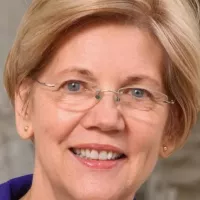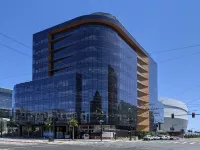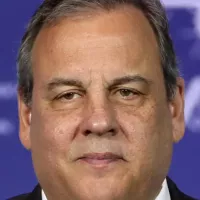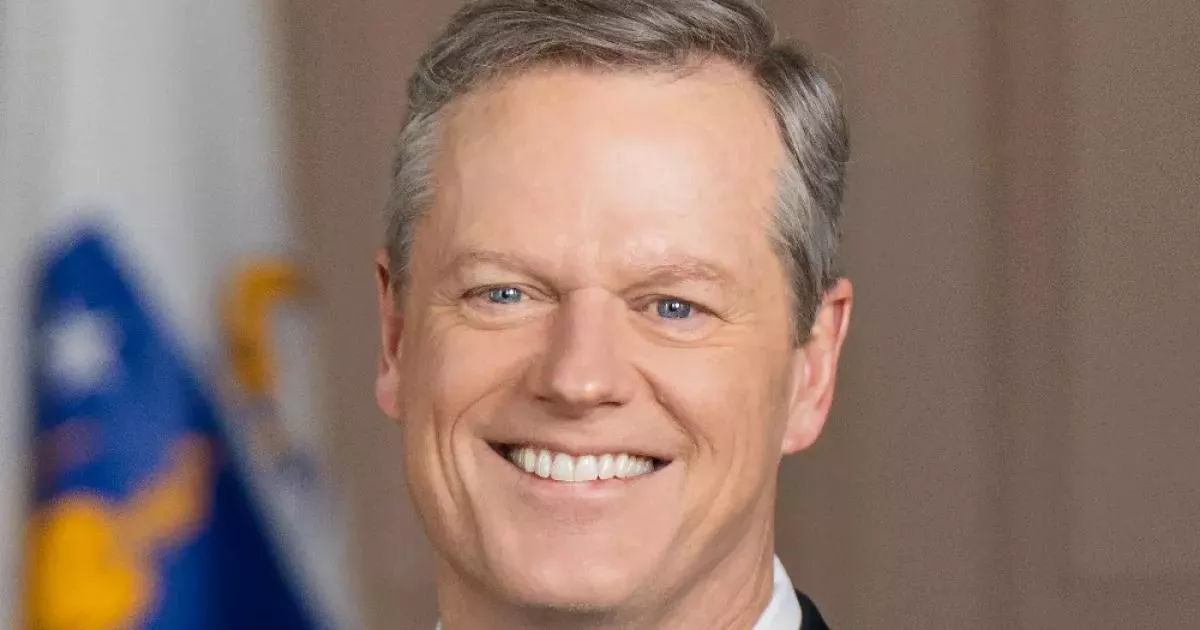Charles Duane Baker Jr. is an American politician who served as the 72nd governor of Massachusetts from 2015 to 2023. A Republican, he also held cabinet positions under two prior Massachusetts governors and was CEO of Harvard Pilgrim Health Care for a decade. Currently, he is the president of the National Collegiate Athletic Association.
1928: Birth of Charles Duane Baker (Father)
Charlie Baker's father, Charles Duane Baker, was born in 1928.
1932: Birth of Alice Elizabeth "Betty" Ghormley (Mother)
Charlie Baker's mother, Alice Elizabeth "Betty" Ghormley, was born in 1932.
1934: Death of Charles D. Baker (Great-Grandfather)
Charlie Baker's great-grandfather, Charles D. Baker, passed away in 1934.
November 13, 1956: Birth of Charlie Baker
Charlie Baker was born on November 13, 1956.
1965: Charles Duane Baker Sr. Becomes Vice President of Harbridge House
In 1965, Charlie Baker's father, Charles Duane Baker Sr., became the vice president of Harbridge House, a management consulting firm in Boston.
1969: Move to Washington, D.C.
The Baker family relocated to Washington, D.C. in 1969 when Charlie Baker's father accepted a position in the Nixon Administration.
1971: Passing of Charles D. Baker Jr. (Grandfather)
Charlie Baker's grandfather, Charles D. Baker Jr., passed away around 1971.
1971: Return to Needham, Massachusetts
The Baker family moved back to Needham, Massachusetts, in 1971.
1975: Graduation from Needham High School
Charlie Baker graduated from Needham High School in 1975, alongside Phil Murphy, the future Governor of New Jersey.
1979: Graduation from Harvard College
Charlie Baker graduated from Harvard College in 1979 with a Bachelor of Arts in English.
1987: Baker Marries Lauren Cardy Schadt
Charlie Baker married Lauren Cardy Schadt in 1987. Schadt, also a Kellogg School of Management graduate, was working as an assistant account executive at a New York advertising agency at the time. She is the daughter of James P. Schadt, a prominent business executive who served as CEO of Reader's Digest and Cadbury Schweppes Americas Beverages.
January 1991: Appointment as Undersecretary of Health and Human Services
Bill Weld, the incoming Republican governor of Massachusetts, appointed Charlie Baker as undersecretary of health and human services in January 1991.
1991: Appointment as Massachusetts Undersecretary of Health and Human Services
Charlie Baker was appointed as the Massachusetts Undersecretary of Health and Human Services under Governor Bill Weld in 1991.
November 1992: Promotion to Secretary of Health and Human Services
Charlie Baker was promoted to the position of Secretary of Health and Human Services in November 1992.
1992: Appointment as Secretary of Health and Human Services of Massachusetts
In 1992, Charlie Baker was appointed as the Secretary of Health and Human Services of Massachusetts.
1994: Re-elected as Governor in Landslide Victory
Baker's re-election campaign in 1994 resulted in a landslide victory, securing him a second term with the highest vote total ever recorded in a Massachusetts gubernatorial election. His performance marked the most successful run by a Republican gubernatorial candidate in the state since Bill Weld's re-election in the same year.
1997: Weld's Resignation and Cellucci's Governorship
Following the resignation of Governor William Weld in 1997, Paul Cellucci assumed the role of acting governor, and Charlie Baker continued to serve as the Secretary of Administration and Finance.
1997: Federal Government's Plan to Cut Big Dig Funding
In 1997, the federal government made plans to reduce funding for the Big Dig project by $300 million annually.
September 1998: CEO of Harvard Vanguard Medical Associates
In September 1998, Charlie Baker started his career in healthcare by becoming the CEO of Harvard Vanguard Medical Associates, a physicians' group in New England.
1998: Declined Lieutenant Governor Offer
Paul Cellucci offered Charlie Baker the lieutenant governor position on his ticket in mid-1998, but Baker declined.
May 1999: President and CEO of Harvard Pilgrim Health Care
In May 1999, Charlie Baker was promoted to President and CEO of Harvard Pilgrim Health Care, the parent company of Harvard Vanguard Medical Associates. During this time, the company was facing significant financial losses. Baker took decisive actions, including workforce reduction, premium increases, and strategic partnerships, to navigate the company back to profitability.
2004: Elected to Swampscott Board of Selectmen
In 2004, Baker entered local politics and was elected to the Swampscott Board of Selectmen. His tenure was marked by a focus on fiscal responsibility and a pragmatic approach to local governance.
August 2005: Declined to Run for Governor
In August 2005, despite being considered a frontrunner for the Republican nomination for governor, Baker announced his decision not to run. He cited family considerations and the challenges of campaigning against the current Lieutenant Governor as reasons for his decision.
2006: Consideration of Run for Massachusetts Governor
Charlie Baker considered running for Massachusetts governor in 2006.
2006: Member of Governor's Transition Committee
Following the 2006 election, Baker was appointed to the Budget and Finance working group for incoming Governor Deval Patrick's transition team, showcasing his expertise in fiscal matters.
2006: Considered for Governor
In 2006, with Governor Mitt Romney not seeking re-election, Baker was considered a strong contender for the Republican nomination. However, he ultimately decided not to run.
2007: Blue-Ribbon Panel Report on Big Dig Financing
A blue-ribbon panel revealed in 2007 that the cost overruns associated with the Big Dig, along with Charlie Baker's financing plan, had resulted in a $1 billion annual underfunding of the state's transportation system.
2007: Declined Re-election Bid
After serving three years, Baker decided not to seek re-election for the Swampscott Board of Selectmen in 2007.
2007: Board of Trustees at Beth Israel Deaconess Medical Center
In 2007, Baker's appointment to the board of trustees at Beth Israel Deaconess Medical Center sparked controversy due to his role in the insurance industry, raising concerns about potential conflicts of interest. Both Baker and the hospital's CEO denied these claims.
2008: Joined NHIOP Public Advisory Board
In 2008, Baker joined the Public Advisory Board of the New Hampshire Institute of Politics (NHIOP) at Saint Anselm College, further engaging in political spheres.
July 8, 2009: Announced Candidacy for Governor
On July 8, 2009, Baker formally announced his candidacy for the Massachusetts gubernatorial election.
July 2009: Resignation from Harvard Pilgrim Health Care
Charlie Baker stepped down from his role as CEO of Harvard Pilgrim Health Care to run for governor of Massachusetts in July 2009.
January 30, 2010: Campaign Launch
Baker's campaign for Governor officially commenced on January 30, 2010.
April 17, 2010: Won Republican Nomination for Governor
Baker secured the Republican nomination for Governor at the state convention on April 17, 2010, avoiding a primary challenge.
2010: Joined General Catalyst Partners and Tremont Credit Union
After the 2010 election, Baker took on roles as an executive in residence at General Catalyst Partners and joined the board of directors at the Tremont Credit Union, expanding his professional portfolio.
2010: Loss in the Gubernatorial Election
Charlie Baker ran for governor of Massachusetts but lost to the Democratic incumbent, Deval Patrick, in 2010.
September 4, 2013: Announced Second Run for Governor
On September 4, 2013, Baker declared his intention to run for governor again in the upcoming 2014 election.
November 25, 2013: Challenged in Republican Primary
Mark Fisher, a businessman affiliated with the Tea Party movement, announced his candidacy for governor, challenging Baker in the Republican primary.
December 2013: Selected Karyn Polito as Running Mate
In a significant move, Baker chose Karyn Polito, a former opponent of same-sex marriage who had shifted her stance to support marriage equality, as his running mate for the gubernatorial election.
July 2014: Criticized for Stance on Gun Control
During the 2014 gubernatorial race, Baker faced criticism from Democrats for his ambiguous position on a provision within the state's new gun control law, which granted police chiefs discretion in denying firearms identification cards. He later clarified his stance, stating he would have signed the bill in its existing form.
2014: Won Republican Nomination for Governor
Baker emerged victorious in the Republican primary, securing the party's nomination for the 2014 gubernatorial election.
2014: Victory in Massachusetts Gubernatorial Election
Charlie Baker won the Massachusetts gubernatorial election in 2014, defeating Democratic nominee Martha Coakley.
2014: Gas Tax Indexing Repeal Supported
Prior to his governorship, Charlie Baker supported the 2014 ballot measure to repeal the indexing of the state gas tax to inflation.
2014: Record Breaking Snowfall in Boston
The record-breaking snowfall in Boston in 2014 highlighted the need for climate change adaptation measures.
January 8, 2015: Inaugurated as the 72nd Governor of Massachusetts
On January 8, 2015, Baker was sworn in as the 72nd Governor of Massachusetts, marking the start of his first term.
February 2015: Baker Forms Working Group to Address Opioid Epidemic
Charlie Baker announced the formation of a working group dedicated to developing a statewide strategy to combat the opioid crisis in Massachusetts in February 2015.
February 2015: Transportation Network Company Notice Issued
The Massachusetts Department of Public Utilities, under Governor Baker's direction, issued a notice clarifying the status of transportation network companies like Uber and Lyft in February 2015.
May 2015: Request to Delay ACA Changes for Small Businesses
Baker requested a delay from U.S. Secretary of Health and Human Services Sylvia Mathews Burwell on changes to the small business health insurance market in Massachusetts under the Affordable Care Act in May 2015.
May 2015: Energy Storage Initiative Launched
In May 2015, Baker's administration announced a $10 million energy storage initiative.
June 2015: Capital Budget Submitted
In June 2015, Governor baker submitted a $2.13 billion capital budget for fiscal year 2016.
June 2015: Baker Announces Opioid Addiction Awareness Campaign and Funding Proposal
In June 2015, the Massachusetts Department of Public Health launched a public awareness campaign concerning opioid addiction. This coincided with Baker's announcement of a $34.5 million proposal, guided by the working group's recommendations. This proposal included a $5.8 million program to transition the management of individuals with substance abuse disorders from state prisons to state hospitals under the Massachusetts Executive Office of Health and Human Services.
July 2015: Veto of In-State Tuition for Illegal Immigrants While Supporting DACA Recipients
In July 2015, Baker declared his intention to veto any legislation granting in-state tuition and state aid to illegal immigrants attending public universities while maintaining his support for an existing statute providing these benefits to DACA recipients.
July 2015: Legislation Filed to Stabilize Electricity Rates
In July 2015, Baker's administration filed legislation to stabilize electricity rates in Massachusetts by increasing access to hydroelectricity.
September 2015: Initial Support for Accepting Syrian Refugees
Baker initially supported President Obama's September 2015 proposal to accept 10,000 Syrian Civil War refugees into the United States.
October 2015: USAA Insurance Policy Approved
Governor Baker and the Division of Insurance approved a USAA insurance policy offering additional coverage to transportation network company drivers in October 2015.
October 2015: Charter School Cap Increase Legislation Filed
In October 2015, Governor Baker proposed legislation to increase the state's cap on new charter schools.
October 2015: Economic Development and Housing Strategy Announced
In October 2015, Governor Baker revealed a strategy to use underutilized state land for economic development and housing.
November 2015: Opposition to Accepting More Syrian Refugees
Following the November 2015 Paris attacks, Baker reversed his stance and opposed accepting more Syrian refugees into Massachusetts until gaining a better understanding of the federal government's vetting process for them.
November 2015: Baker Supports Legislation and Initiatives to Combat Drug Addiction
In November 2015, Charlie Baker, alongside Boston Mayor Marty Walsh, testified before the state legislature in support of legislation aimed at combating the opioid epidemic. The legislation garnered support from various Massachusetts county sheriffs and the Boston City Police Commissioner. During the same month, Baker introduced a statewide anti-stigma media campaign to challenge stereotypes about drug addiction. He also launched a core competencies program focused on preventing and managing prescription drug misuse at medical schools across the state. Additionally, he signed a bill into law, criminalizing fentanyl trafficking.
2015: Massachusetts Greenhouse Gas Emissions Rise
Data released by the Massachusetts Department of Environmental Protection showed that greenhouse gas emissions in the state increased by 3% in 2015.
2015: Baker's Taste in Music and Movies Highlighted
In 2015, Boston magazine published an article about Charlie Baker's personal preferences, noting his fondness for classic rock music from the 1970s and '80s. The article highlighted his appreciation for bands like the Ramones, Green Day, and the Dropkick Murphys. Additionally, Baker, a self-proclaimed Star Wars enthusiast, expressed his preference for the original trilogy and his lack of enthusiasm for the prequels and sequels.
2015: Paris Agreement
The Paris Agreement, adopted in 2015, is an international treaty focused on climate change mitigation.
January 2016: Proposed Economic Development Bill
Baker demonstrated his commitment to economic growth by introducing a comprehensive, five-year economic development bill worth $918 million in January 2016. This bill would later be signed into law in August of the same year.
January 2016: General Electric Moves Headquarters to Boston
General Electric relocated its headquarters to South Boston in January 2016, following incentives from the Baker administration and the City of Boston.
January 2016: Vocational Education Funding and Education Funding Increases Announced
Governor Baker announced funding for vocational education, increased Chapter 70 local education funding, and boosted unrestricted local aid for education in January 2016.
January 2016: Massachusetts on Track to Meet Greenhouse Gas Reduction Goals
In January 2016, Baker's administration announced that Massachusetts was on track to meet its greenhouse gas reduction goals.
January 2016: Baker Signs Bill Prohibiting Civil Commitment of Women for Substance Abuse to MCI Framingham
In January 2016, Charlie Baker enacted a bill that legally prohibited the practice of civilly committing women struggling with substance abuse to MCI Framingham. This measure aimed to redirect those commitments to dedicated treatment facilities like Taunton State Hospital.
February 2016: Initiative for Clean Energy Access
In February 2016, Baker launched a $15 million initiative creating a working group to identify better ways to fund clean energy access for low- and middle-income residents.
February 2016: Tanning Bed Age Restriction Law
In February 2016, Baker signed a bill into law raising the minimum age for using tanning facilities to 18, aiming to reduce skin cancer rates among minors.
February 2016: Baker Announces Federal Grants and Support for Opioid and Heroin Crime Reduction
In February 2016, Charlie Baker announced the allocation of $2.5 million in federal grants to support Massachusetts criminal justice agencies in their endeavors to curb opioid and heroin-related crimes. Additionally, he revealed a core competencies program designed to address prescription drug misuse in dental schools across the state. Baker also voiced his support for the Obama administration's $1.1 billion proposal, aimed at broadening access to treatment for individuals battling drug addiction.
March 2016: Support for Opioid Prescription Guidelines and Legislation
In March 2016, Baker showed his commitment to addressing the opioid epidemic by supporting new CDC guidelines for opioid prescriptions and signing a bill that repealed automatic license suspensions for drug convictions. He also signed a compromise version of the comprehensive opioid legislation he had proposed earlier.
March 2016: Endorsement for Hydroelectricity Legislation
In March 2016, Baker's legislation to increase access to hydroelectricity received endorsements from previous Energy and Environmental Affairs Secretaries.
March 2016: Opposition to Charter School System Overhaul
In March 2016, Governor Baker expressed his opposition to a proposed overhaul of the state's charter school system under consideration in the Massachusetts Senate.
March 2016: Health Safety Net Program Cuts and Hospital Pricing Reform Advocacy
In March 2016, the Baker administration cut $60 million from the state's Health Safety Net program. Baker also pushed for legislative action on hospital pricing instead of a ballot initiative.
April 2016: Legislation for Clean Water Act Permit Oversight
In April 2016, Baker proposed legislation to delegate oversight of Clean Water Act pollution discharge permits from the EPA to the state Department of Environmental Protection.
April 2016: College Affordability and Completion Plan
In April 2016, Baker announced a college affordability and completion plan for the state's public universities and colleges.
April 21, 2016: Support for EPA in Housatonic River Cleanup and Funding for Lead Testing in Schools
On April 21, 2016, Baker's administration sided with the EPA in a dispute with General Electric regarding the cleanup of the Housatonic River. The administration also announced $2 million in funding for a lead testing program in Boston public schools after elevated lead levels were found in drinking water.
May 2016: Permission for Year-Round Small Business Health Insurance Purchases
In May 2016, Baker's administration announced that Massachusetts received permission to continue allowing small businesses to buy health insurance outside the traditional enrollment period.
May 2016: Affordable Housing Investment Announced
Governor Baker committed $1.1 billion to affordable housing development and preservation in May 2016 and created a $100 million fund for workforce housing.
May 2016: Launch of Statewide Drug Overdose Awareness Campaign
In May 2016, Baker, in collaboration with Attorney General Maura Healey, launched a statewide campaign to raise awareness about Good Samaritan laws. These laws offer protection to individuals who report drug overdoses.
June 2016: Meeting of New England Governors on Opioid Epidemic
To address the growing opioid crisis, Baker met with other New England governors in June 2016. They aimed to discuss and coordinate reforms such as setting limits on opioid prescriptions.
July 2016: Pre-Kindergarten Teacher Pay Increase Vetoed
Governor Baker vetoed a pay raise for pre-kindergarten teachers in July 2016.
July 2016: Baker Signs Bill Preventing Illegal Immigrants from Obtaining Driver's Licenses
In July 2016, Charlie Baker signed a bill that prevents undocumented immigrants from obtaining driver's licenses.
August 2016: Transportation Bills Signed into Law
Governor Baker signed bills in August 2016 to enhance street safety, fund small bridge repairs, and authorize highway program funding.
August 2016: Improvements to Prescription Monitoring and Expansion of Training Programs
In August 2016, Baker focused on improving the state's prescription monitoring program and expanding training programs for healthcare providers on managing prescription drug misuse.
August 2016: Bipartisan Pay Equity Bill Signed
In August 2016, Baker signed a bipartisan pay equity bill to address gender-based pay disparities in the state. The law took effect on July 1, 2018.
August 2016: Signed Municipal Finance Modernization Bill
In August 2016, Baker signed a significant piece of legislation aimed at modernizing municipal finance, a policy he had initially put forth in December of the preceding year.
August 2016: Energy Diversification Legislation Signed
In August 2016, Baker signed into law energy diversification legislation, including provisions for energy storage and offshore wind power.
August 2016: Affordable Housing Development Projects Receive Funding
In August 2016, Governor Baker announced $90 million in funding for 26 affordable housing development projects across Massachusetts.
August 2016: Transportation Network Company Bill Signed
In August 2016, Governor Baker signed a law to regulate transportation network companies, including a per-ride surcharge, insurance requirements, and background checks for drivers.
August 2016: Veto Override on Lyme Disease Treatment Coverage and HIV Medication Coverage Mandate
In August 2016, the state legislature overrode Baker's veto of a bill requiring health insurance to cover long-term Lyme disease treatment. Later that month, Baker signed a bill into law requiring insurance coverage for treating HIV-associated lipodystrophy.
September 2016: Executive Order for Statewide Climate Change Adaptation Plan
In September 2016, Baker issued an executive order for state agencies to develop a comprehensive adaptation plan for climate change.
September 2016: Pilot Program for MicroMasters Programs
In September 2016, Baker's administration announced their intention to work with the state's Department of Higher Education and the University of Massachusetts system to develop a pilot program to support the MicroMasters programs.
September 2016: Massachusetts Ranked First in Energy Efficiency
In September 2016, the American Council for an Energy-Efficient Economy ranked Massachusetts first in energy efficiency for the sixth straight year.
October 2016: Criticism of FDA Drug Approval Process and Support for ACA Discussion
Baker criticized the FDA's generic drug approval process in October 2016. He also expressed support for open discussions on potential changes to the Affordable Care Act.
October 2016: Driverless Car Testing Framework and Electronic Tolling System
In October 2016, Governor Baker issued an executive order for a driverless car testing framework and oversaw the launch of electronic tolling on the Massachusetts Turnpike.
November 2016: Approval for MassHealth Restructuring Waiver
In November 2016, Baker's administration secured approval to restructure MassHealth, the state's Medicaid program. The restructuring involved a five-year waiver and $52.4 billion.
November 2016: Charter School Cap Ballot Initiative and STEM Internship Program Expansion
Governor Baker campaigned for a failed ballot initiative to raise the charter school cap and expanded a STEM internship program for high school students in November 2016.
December 2016: Support for 21st Century Cures Act
Baker voiced his support for the 21st Century Cures Act, a piece of legislation focused on healthcare innovation and research, in December 2016.
December 2016: Pilot Program for Alternative Treatments for Workers' Compensation
Baker announced a pilot program in December 2016 to provide alternative treatments to opioids for workers with settled claims for on-the-job injuries.
December 2016: Baystate Health Funding Cut
Due to Baker's midyear budget cuts, Baystate Health faced a $1 million funding loss in December 2016.
December 2016: Regulations to Reduce Greenhouse Gas Emissions
In December 2016, Baker's administration released regulations to reduce greenhouse gas emissions from various industries.
2016: Death of Alice Elizabeth "Betty" Baker (Mother)
Charlie Baker's mother, Alice Elizabeth "Betty" Baker, passed away in 2016.
2016: Transportation Infrastructure Aid Released
On his first day in office in 2016, Governor Baker directed $100 million in aid for local transportation infrastructure upgrades.
January 2017: Defense of ACA Provisions and Call for Measured Repeal
In January 2017, Baker sent an open letter to U.S. House Majority Leader Kevin McCarthy defending parts of the Affordable Care Act. He urged Congress against a rushed repeal of the healthcare law.
January 2017: Support for Women's Marches
Baker expressed his support for the Women's Marches held throughout the United States in January 2017.
January 2017: Law to Promote Electric Vehicles
In January 2017, Baker signed a law to promote the sale and use of electric vehicles to meet emission reduction goals.
January 2017: Robotics Manufacturing Institute Partnership
In January 2017, the Baker administration announced a $250 million public-private partnership to create a robotics manufacturing institute in Massachusetts.
January 2017: Proposed Employer Health Insurance Assessment
In his fiscal year 2018 state budget proposal, Baker suggested a $2,000-per-employee assessment on businesses without health insurance, aiming to address MassHealth spending growth. This proposal faced opposition from the business community but found support among healthcare unions.
January 2017: Baker Opposes Trump Administration's Travel Bans
When Donald Trump became president in January 2017, Charlie Baker opposed the Trump administration's initial and revised travel bans. He argued that focusing on religion would not make the country safer. Baker wrote a letter to the U.S. Secretary of Homeland Security, expressing concerns about the travel ban's effects on Massachusetts businesses, universities, and medical centers.
February 2017: Life Science Facilities Grants Announced
Governor Baker's administration announced $35 million in grants for life science facilities at various educational and research institutions in February 2017.
February 2017: Support for Renewable Energy
In February 2017, Baker joined a bipartisan coalition of governors advocating for renewable energy in a letter to President Trump.
February 2017: Capital Grants for Life Science Facilities
In February 2017, Baker's administration announced $35 million in capital grants for life science facilities at 14 colleges, graduate schools, and research institutes in the state.
February 2017: Baker Reestablishes State's Black Advisory Commission
In February 2017, Charlie Baker issued an executive order to reestablish the state's Black Advisory Commission to advise his administration on issues concerning the Black community in Massachusetts.
February 2017: Record Health Insurance Enrollment and Bridgewater State Hospital Contract
In February 2017, the Baker administration reported the highest-ever enrollment in the Massachusetts Health Connector since the ACA's implementation. The administration also announced a contract with Correct Care Solutions to provide clinical patient care at Bridgewater State Hospital.
February 2017: Release of Data on Opioid-Related Deaths
The Massachusetts Department of Public Health released data in February 2017 showing an increase in estimated opioid-related deaths, reaching nearly 2,000 in 2016, up from under 1,400 in 2014 and under 1,800 in 2015.
March 2017: Opposition to American Health Care Act
Baker publicly opposed the American Health Care Act (AHCA) in March 2017, citing potential funding losses for Massachusetts.
March 2017: Refiling of Clean Water Act Legislation
Baker refiled the legislation for state oversight of Clean Water Act permits in March 2017 after facing opposition from Democrats.
March 2017: Appointment to Trump Administration's Opioid Commission
Baker's expertise in handling the opioid crisis was recognized nationally when he was appointed to the Trump Administration's Opioid and Drug Abuse Commission in March 2017, chaired by Governor Chris Christie of New Jersey.
March 2017: Proposed Pay Increase for Pre-K Teachers
In March 2017, Baker proposed a six percent pay increase for pre-kindergarten teachers.
April 2017: Grants for Public Water Suppliers
In April 2017, Baker's administration granted $900,000 to five different public water suppliers.
April 2017: Transportation Network Company Background Check Data Released
Data released in April 2017 showed that over 8,000 applicants failed the state's background check for transportation network company drivers.
April 2017: Funding for Opioid Abuse Reduction and Federal Grant
Demonstrating his commitment to combating the opioid crisis, Baker announced additional funding in April 2017 for criminal justice agencies to support opioid and heroin abuse reduction programs in Massachusetts gateway cities. Moreover, Massachusetts received $12 million in federal funding for its innovative opioid epidemic policies.
April 2017: Grants for Energy Efficiency Projects
In April 2017, Baker announced $10 million in grants to increase access for low-income residents to energy efficiency projects.
April 2017: Capital Funding for UMass Boston Parking Garage Repairs
In April 2017, Baker's administration announced $78 million in capital funding towards repairs of the University of Massachusetts Boston underground parking garage.
April 2017: Worcester Polytechnic Institute Receives Grant
In April 2017, the Baker administration awarded a $5 million grant to Worcester Polytechnic Institute for a digital healthcare development center.
May 2017: Pilot Program for Free College Tuition
In May 2017, Baker and Boston Mayor Marty Walsh announced a pilot program making college tuition and mandatory fees free to qualifying low-income Boston public high school graduates attending specific community colleges.
May 2017: Baker Expresses Opposition to Sanctuary State Legislation
In May 2017, Charlie Baker expressed his opposition to a proposal that would make Massachusetts a sanctuary state. He stated his belief that sanctuary status decisions were best made at the local level.
May 2017: Open Letter Urging Commitment to Paris Agreement
In May 2017, prior to the United States' withdrawal from the 2015 Paris Agreement on climate change, Baker joined Vermont Governor Phil Scott in writing an open letter to U.S. Secretary of Energy Rick Perry. They urged the Trump Administration to remain committed to the agreement.
June 2017: Opposition to AHCA and Call for Bipartisan Reform
In June 2017, Baker joined forces with other governors to oppose the AHCA due to its Medicaid cuts. He advocated for a bipartisan approach to healthcare reform.
June 2017: First Meeting of the Opioid and Drug Abuse Commission
Baker actively participated in the first meeting of the Opioid and Drug Abuse Commission in June 2017.
June 2017: Energy Storage Target Announced
In June 2017, Baker's administration announced a 200 megawatt-hour energy storage target.
June 2017: RFP Issued for Energy Diversification Law
In June 2017, Massachusetts utilities issued the first RFP under the energy diversification law signed by Baker in August 2016.
July 2017: Law Mandating Workplace Accommodations for Pregnant Employees
Baker signed a bill in July 2017 that requires employers to provide "reasonable accommodations" for pregnant employees and prohibits employment discrimination based on pregnancy. The law went into effect in April 2018.
August 2017: Baker's Administration Proposes Legislation on Detaining Illegal Immigrants
Following a Massachusetts Supreme Judicial Court ruling in August 2017, that prevented local police from detaining individuals solely on federal immigration requests, the Baker administration put forward legislation. This legislation proposed allowing the Massachusetts State Police and local departments to detain individuals previously convicted of a felony or undocumented immigrants deemed a threat to public safety. However, it wouldn't authorize local police to enforce federal immigration law.
August 2017: Proposal to Increase Penalties for Drug Distribution Leading to Death
In August 2017, Baker proposed stricter penalties for illegal drug distribution resulting in death, with a maximum sentence of life imprisonment and a mandatory minimum of five years, aligning with the penalties for vehicular manslaughter while intoxicated.
August 2017: New Healthcare Fees and Fines Signed into Law
In August 2017, after showing a willingness to compromise, Baker signed $200 million in new fees and fines for Massachusetts employers into law to address rising MassHealth expenditures.
September 2017: Curbed Healthcare Spending Growth
Data released in September 2017 by the state government's Center for Health Information and Analysis indicated that Massachusetts successfully slowed the growth of its healthcare spending for the first time in three years.
September 2017: Baker Opposes Trump's Decision to Phase Out DACA
In September 2017, Charlie Baker voiced his opposition to President Trump's decision to phase out the Deferred Action for Childhood Arrivals (DACA) program. He also said that U.S. Immigration and Customs Enforcement (ICE) raids targeting sanctuary cities should prioritize arresting undocumented immigrants with criminal convictions, not those whose only offense was entering the country illegally.
September 2017: Announced Boston Harbor Dredging Project
In a collaborative effort, Baker joined forces with Massachusetts U.S. Senators Elizabeth Warren and Ed Markey, along with Representative Stephen F. Lynch and officials from various organizations, to announce the launch of a major dredging project in Boston Harbor. This $350 million undertaking aimed to enhance the harbor's capacity to accommodate larger vessels, signaling a commitment to bolstering the region's maritime infrastructure.
October 2017: Expansion of Core Competencies Program and Advocacy for Opioid Funding
Baker's administration extended the core competencies program on prescription drug misuse to social work schools in October 2017. He also advocated for full funding of the Opioid and Drug Abuse Commission's proposals during a panel discussion at the National Academy of Medicine.
October 2017: Reaffirmation of Support for Contraceptive Mandates
Following the Trump administration's new regulations permitting insurers and employers to opt out of contraceptive mandates, Baker reiterated his support for these mandates in October 2017.
October 2017: Launch of Early College Program
In October 2017, Baker attended the launch of an early college program at Lawrence High School allowing students to take courses at Merrimack College or Northern Essex Community College.
October 2017: Opposition to ACA Cost-Sharing Reduction Payments Termination
In October 2017, Charlie Baker opposed the Trump administration's decision to end ACA cost-sharing reduction payments. He joined other governors in sending a letter to Senate leadership advocating for the Bipartisan Health Care Stabilization Act of 2017.
November 2017: Handheld Cellphone Use Ban While Driving Proposed
Governor Baker urged the legislature to pass a law banning handheld cellphone use while driving in November 2017.
November 2017: Expansion of English as a Second Language Options
In November 2017, Baker signed into law a bill expanding options for schools in fulfilling English as a second language requirements for their immigrant students.
November 2017: Advocacy for CHIP Reauthorization
In November 2017, Baker wrote to House leaders urging the reauthorization of the Children's Health Insurance Program (CHIP).
November 2017: Baker Urges Trump Administration to Continue TPS for Central American Countries
In November 2017, Charlie Baker wrote an open letter to the acting U.S. Secretary of Homeland Security, urging the Trump administration to continue Temporary Protected Status (TPS) for citizens of El Salvador, Haiti, and Honduras.
November 2017: Release of Commission Report and Data on Opioid Deaths
The Opioid and Drug Abuse Commission, on which Baker served, released its final report in November 2017. Additionally, data from the Massachusetts Department of Public Health indicated a 10% decline in opioid overdose deaths in the state during the first nine months of 2017.
December 2017: Grants Awarded for Energy Storage Development
In December 2017, Baker's administration announced $20 million in grants to develop the state's energy storage market.
2017: Charter School Reimbursement Formula Increase Proposed
Governor Baker proposed a $20.5 million increase to the state's charter school reimbursement formula for school districts in 2017.
2017: Tax Cuts and Jobs Act
The Tax Cuts and Jobs Act of 2017, which included provisions for "opportunity zones", was enacted.
January 2018: Expansion of Drug Disposal Boxes and Proposal for Involuntary Holds
Baker announced the addition of drug disposal boxes to 42 CVS pharmacies across the state in January 2018. He also proposed a bill to allow hospitals to involuntarily hold addiction patients for 72 hours while seeking treatment options.
January 2018: Transportation Needs Commission Established
Governor Baker signed an executive order in January 2018 to create a commission to study the state's transportation requirements.
January 2018: Preliminary Approval for Northern Pass Project
In January 2018, Baker's administration announced preliminary approval for Eversource Energy's Northern Pass Project for hydropower procurement.
February 2018: Massachusetts Mutual Life Insurance Company Announcement
In February 2018, Governor Baker welcomed the announcement by Massachusetts Mutual Life Insurance Company to add 1,500 jobs in Springfield and build a new location in South Boston.
February 2018: Baker Continues Opposition to Revised Sanctuary State Legislation
In February 2018, despite revisions to the sanctuary state legislation from the previous year, Baker continued to oppose the revised version put forth in the state legislature.
February 2018: Loans for Water Infrastructure Projects
In February 2018, the Baker administration announced $610 million in loans for clean water and drinking water projects across Massachusetts. The funding aimed to improve water quality and infrastructure.
February 2018: Supplemental Funding for Family Planning Services
In February 2018, the Baker administration announced a supplemental spending bill including $1.6 million to backfill federal funding for Planned Parenthood clinics and support clinical family planning services.
February 2018: Data Showing Decline in Opioid Overdose Deaths
Positive results from Baker's efforts were evident in February 2018, as data revealed an 8% decrease in opioid overdose deaths in Massachusetts during 2017.
March 15, 2018: Climate Resiliency Bond Bill Submission
Following severe nor'easters in early March, Baker submitted a $1.4 billion climate resiliency bond bill on March 15, 2018. The bill urged Massachusetts town governments to create vulnerability and hazard mitigation plans to address specific climate change challenges.
March 2018: Enhanced Patient Privacy Protections Law
Baker signed a law in March 2018 that strengthened patient privacy protections from health insurance providers.
March 2018: Business Confidence Index Hits 17-Year High
In March 2018, the Associated Industries of Massachusetts announced that employer confidence in the state reached a 17-year high, and Governor Baker filed a $610 million economic development bill.
March 2018: Termination of Northern Pass Project Selection
In March 2018, the Massachusetts Department of Energy Resources announced the termination of the Northern Pass Hydro project and began negotiations on an alternative.
April 2018: Opportunity Zone Designations Requested
Governor Baker requested 138 census tracts in Massachusetts be designated as "opportunity zones" under the Tax Cuts and Jobs Act of 2017 in April 2018.
April 2018: Acquisition of Mount Ida College Campus
In April 2018, University of Massachusetts Amherst announced it would acquire Mount Ida College's campus after its closure, sparking opposition from UMass Boston faculty and students.
April 2018: Workplace Pregnancy Discrimination Protections Effective
In April 2018, a law went into effect in Massachusetts requiring employers to provide reasonable accommodations for pregnant workers and prohibiting employment discrimination related to pregnancy.
May 2018: Approval of Mount Ida Campus Sale
Despite controversy, the sale of the Mount Ida campus to UMass Amherst was approved by Attorney General Maura Healey's office in May 2018.
May 2018: Continued Decline in Opioid Deaths and Federal Grant for Prevention Programs
The positive trend continued, with data in May 2018 indicating a 5% decline in opioid overdose deaths in Massachusetts during the first three months of 2018 compared to the same period in 2017. The state also received an $11.7 million federal grant for opioid prevention, treatment, and recovery initiatives.
June 2018: East-West Passenger Rail Line Initiatives Announced
Governor Baker, along with other officials, announced initiatives for an east-west passenger rail line in Massachusetts, including a feasibility study and a pilot service between Greenfield and Springfield, in June 2018.
June 2018: Baker Directs National Guard Not to Assist in Trump's Border Enforcement
In June 2018, Charlie Baker instructed the Massachusetts National Guard against sending any personnel or resources to the U.S.-Mexico border. He aimed to prevent them from assisting the Trump administration in enforcing its "zero-tolerance" immigration policy. Baker deemed the Trump administration's family separation policy "cruel and inhumane."
June 22, 2018: Baker's Son Accused of Sexual Assault
On June 22, 2018, Andrew "AJ" Baker, son of Charlie Baker, faced allegations of sexual assault from a woman aboard a JetBlue flight. The following week, in response to inquiries about the incident, Baker stated that his son would fully cooperate with the Massachusetts U.S. Attorney's Office's independent investigation into the matter.
July 1, 2018: Pay Equity Law Takes Effect
On July 1, 2018, the pay equity bill signed by Baker, designed to reduce gender-based pay gaps in Massachusetts, went into effect.
July 2018: Road Congestion Pricing Pilot Program Vetoed
Governor Baker line-item vetoed a pilot program for road congestion pricing in July 2018.
July 2018: Legislation for Financial Reporting by Colleges
In July 2018, Baker included an amendment to a supplemental appropriations bill requiring public and private colleges to report financial liabilities to the state, which he later signed into law.
July 2018: Repeal of Obsolete Abortion Laws
In July 2018, Baker signed a bill repealing Massachusetts abortion laws that would have been retroactively reinstated if Roe v. Wade were overturned, along with laws against adultery, fornication, and doctors prescribing contraceptives to unmarried women.
August 2018: Climate Change Safeguards Legislation
In August 2018, Baker signed bipartisan legislation enacting $2.4 billion in capital spending for climate change safeguards. The funds were allocated towards protecting municipalities, businesses, forests, and environmental resources.
August 2018: Comprehensive Opioid Bill Signed into Law
In August 2018, Baker signed a second comprehensive opioid bill that expanded access to naloxone and addiction treatment centers. The legislation also mandated the transition to secure electronic prescriptions for all opioid prescribers by 2020 and established a commission to examine supervised injection sites and other harm reduction strategies.
September 4, 2018: Won Republican Primary for Governor
Baker successfully secured his re-nomination bid for governor by winning the Republican primary on September 4, 2018, defeating challenger Scott Lively with a significant margin.
September 2018: Federal Funding for Substance Abuse and Mental Health Services
Massachusetts secured $50 million in federal funding in September 2018 to expand access to substance abuse and mental health services, bolstering its efforts to address the opioid crisis.
October 2018: Opposition to Brett Kavanaugh's Supreme Court Nomination
On the eve of Kavanaugh's confirmation vote in October 2018, Baker expressed his belief that Kavanaugh should not be on the Supreme Court, citing concerns over his stance on Roe v. Wade and the sexual assault allegations against him.
November 2018: Mixed Results in Opioid Overdose Deaths and EMS Incidents
Data released in November 2018 presented a mixed picture. While opioid overdose deaths showed a slight decline (1.3% lower) in the first nine months of 2018 compared to the same period in 2017, opioid-related emergency medical service (EMS) incidents saw a concerning 12% increase.
December 2018: Extension of Electric Vehicle Rebate Program and Transportation Commission Report
In December 2018, Baker's administration extended the state's electric vehicle rebate program. Additionally, a transportation commission formed by Baker released a report advocating for all vehicles sold in the state to be electric by 2040.
December 2018: Baker Calls for Suspension of Judge Accused of Aiding Illegal Immigrant
Charlie Baker called for the suspension of a state district court judge in December 2018. The judge was accused of helping an undocumented immigrant avoid being detained by an ICE agent during legal proceedings. Baker called for the suspension until the conclusion of a federal investigation into the incident.
December 2018: Comprehensive Energy Plan Released
In December 2018, the Massachusetts Department of Energy Resources released a comprehensive energy plan in accordance with an executive order by Baker.
2018: Re-election as Governor of Massachusetts
Charlie Baker was re-elected as the governor of Massachusetts in 2018, winning against Democratic challenger Jay Gonzalez.
2018: Transition to Improved Patient Care at Bridgewater State Hospital
In 2018, the Baker administration announced the successful transition of Bridgewater State Hospital to an improved patient care model under Correct Care Solutions.
2018: Ranked as One of the Most Popular Governors
In the lead-up to the 2018 election, Baker garnered recognition for his performance as governor, consistently ranking among the nation's most popular governors.
January 3, 2019: Inaugurated for Second Term as Governor
Baker's second term as Governor of Massachusetts commenced on January 3, 2019, following his successful re-election bid.
January 2019: Baker Announces Intent to Veto Bill Granting Driver's Licenses to Illegal Immigrants
Charlie Baker announced in January 2019 that he would veto any bill granting driver's licenses to illegal immigrants.
January 2019: Decline in Greenhouse Gas Emissions
The Massachusetts Department of Environmental Protection reported a 2.5% decrease in greenhouse gas emissions for the state in 2016.
February 2019: Lease Agreement for Bayside Expo Center
In February 2019, the UMass Board of Trustees unanimously approved a 99-year final lease agreement for the Bayside Expo Center with Accordia Partners.
September 2019: Supported Impeachment Inquiry of Donald Trump
In September 2019, Baker publicly expressed his support for the impeachment inquiry initiated against then-President Donald Trump. He further called for Trump's removal from office following the January 6th Capitol attack, highlighting his critical stance against the former president.
November 2019: Handheld Electronic Device Use While Driving Ban Enacted
A bill banning handheld electronic device use while driving was signed into law by Governor Baker in November 2019.
November 2019: Law Requiring Financial Reporting by Colleges
In November 2019, Baker signed into law a bill requiring public and private colleges and universities to report any financial liabilities or risks to the long-term financial viability of the institution to the Massachusetts Department of Higher Education.
June 2020: Baker Signs Law Making Juneteenth a State Holiday
Charlie Baker signed a law in June 2020, officially recognizing Juneteenth as a state holiday.
December 2020: Veto of Bill Expanding Abortion Access
In December 2020, Baker vetoed a bill aiming to lower the age for abortion without parental consent to 16 and extend the time frame for abortions beyond 24 weeks in specific cases. The legislature overrode his veto five days later.
December 2020: Baker Signs Police Reform Bill Following Black Lives Matter Protests
In December 2020, following the Black Lives Matter protests sparked by the death of George Floyd, Charlie Baker signed a police reform bill, "An Act Relative to Justice, Equity, and Accountability in Law Enforcement in the Commonwealth." Initially hesitant, he'd sent the bill back to the legislature due to concerns over a provision establishing a civilian-led commission on police misconduct. He also opposed the bill's proposed ban on facial recognition technology. Ultimately, he signed the bill after a compromise was reached, limiting the use of facial recognition technology instead of an outright ban.
December 2021: Announcement to Not Seek Re-election
In December 2021, Charlie Baker and Lieutenant Governor Karyn Polito announced their decision not to seek re-election for governor in 2022.
May 2022: Concern over Potential Overturning of Roe v. Wade
Baker stated in May 2022 that overturning Roe v. Wade would be a "massive setback" for women after the leak of Justice Alito's draft opinion in Dobbs v. Jackson Women's Health Organization.
June 2022: Executive Order Protecting Abortion Rights in Massachusetts
Following the Supreme Court's June 2022 decision to overturn Roe v. Wade, Baker signed an executive order ensuring the protection of abortion rights in Massachusetts.
December 15, 2022: Appointment as President of the NCAA
Charlie Baker was appointed as the president of the National Collegiate Athletic Association (NCAA) on December 15, 2022, succeeding Mark Emmert.
2022: End of Tenure as Governor of Massachusetts
Charlie Baker's tenure as the governor of Massachusetts concluded in 2022.
2022: Baker Credits David Bowie for Predicting Negative Impact of Social Media
During a 2022 interview with CNN's Jake Tapper, Charlie Baker cited musician David Bowie as having foreseen the detrimental effects of internet-based social media on the political landscape.
January 3, 2023: Farewell Address
On January 3, 2023, Baker delivered his farewell address as Governor from the Massachusetts State House.
March 1, 2023: Assumption of Role as NCAA President
Charlie Baker assumed the role of president of the National Collegiate Athletic Association (NCAA) on March 1, 2023.
March 2023: Appointment as NCAA President
Baker's career took a significant turn in March 2023 when he was appointed as the sixth president of the NCAA. This made him the first NCAA president without prior experience as a college president or athletic director and the first to come from outside a Power Five conference.
June 2023: Emmert's Tenure as Consultant Ends
After serving as a consultant to the NCAA during the initial months of Baker's presidency, Mark Emmert stepped down permanently in June 2023, marking the official transition to Baker's leadership.
October 2023: Baker Testifies Before Senate Judiciary Committee on NIL Deals
In October 2023, Charlie Baker testified before the US Senate Judiciary Committee, advocating for federal legislation to regulate name, image, and likeness (NIL) agreements in college sports. He emphasized the need for standardized contracts, a national oversight body, and mandatory agent registration. Baker warned that without intervention, Division II and III colleges might resort to converting their teams to club sports to mitigate the financial burden of recruiting student athletes.
2040: Goal for All-Electric Vehicles
Baker's administration set a goal for all vehicles sold in Massachusetts to be electric by 2040.
Mentioned in this timeline

Donald John Trump is an American politician media personality and...

Elizabeth Warren is a prominent American politician and the senior...

Uber Technologies Inc is a multinational transportation company headquartered in...
The Affordable Care Act ACA also known as Obamacare is...

Fentanyl is a potent synthetic opioid analgesic significantly stronger than...

Chris Christie is an American politician who served as the...
Trending

24 minutes ago Jonathan Majors' Movie Comeback and Meagan Good's Support Spark Public Interest.

25 minutes ago Randy Orton eyes 15th WWE Championship reign at Elimination Chamber 2026.
26 minutes ago Europa League Round of 16 Draw: Date, Time, Format, and Ticket Details
26 minutes ago JD Vance visits Plover, Wisconsin, to highlight Trump administration's achievements during midterm campaign.

1 hour ago Will Zalatoris Withdraws from Cognizant Classic Due to Back Issues, Seeks Pain Relief

1 hour ago Ayton's Importance to Lakers, Trade Rumors Swirl, and Recent Double-Double Performance
Popular

Jesse Jackson is an American civil rights activist politician and...

Susan Rice is an American diplomat and public official prominent...

Barack Obama the th U S President - was the...

XXXTentacion born Jahseh Dwayne Ricardo Onfroy was a controversial yet...

Michael Joseph Jackson the King of Pop was a highly...

Michael Jordan widely considered one of basketball's greatest players significantly...
